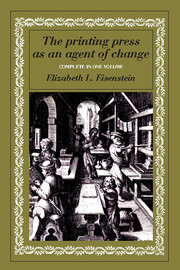Book contents
- Frontmatter
- Dedication
- Contents
- Preface
- Part One Introduction to an Elusive Transformation
- Part Two Classical and Christian Traditions Reoriented; Renaissance and Reformation Reappraised
- Part Three The Book of Nature Transformed
- Conclusion: Scripture and nature transformed
- Bibliographical index
- General index
- Frontmatter
- Dedication
- Contents
- Preface
- Part One Introduction to an Elusive Transformation
- Part Two Classical and Christian Traditions Reoriented; Renaissance and Reformation Reappraised
- Part Three The Book of Nature Transformed
- Conclusion: Scripture and nature transformed
- Bibliographical index
- General index
Summary
I do ingenuously confess that in attempting this history of Printing I have undertaken a task much too great for my abilities the extent of which I did not so well perceive at first…
Joseph Ames, June 7, 1749This book has been composed over the course of some fifteen years. Its inception goes back to 1963 when I read Carl Bridenbaugh's presidential address to the American Historical Association. This address which was entitled ‘The Great Mutation’ belonged to an apocalyptic genre much in vogue at that time (and unfortunately still ubiquitous). It raised alarms about the extent to which a ‘run-away technology’ was severing all bonds with the past and portrayed contemporary scholars as victims of a kind of collective amnesia. Bridenbaugh's description of the plight confronting historians; his lament over ‘the loss of mankind's memory’ in general and over the disappearance of the ‘common culture of Bible reading’ in particular seemed to be symptomatic rather than diagnostic. It lacked the capacity to place present alarms in some kind of perspective – a capacity which the study of history, above all other disciplines, ought to be able to supply. It seemed unhistorical to equate the fate of the ‘common culture of Bible reading’ with that of all of Western civilization when the former was so much more recent – being the by-product of an invention which was only five hundred years old.
- Type
- Chapter
- Information
- The Printing Press as an Agent of Change , pp. ix - xxiiPublisher: Cambridge University PressPrint publication year: 1980



